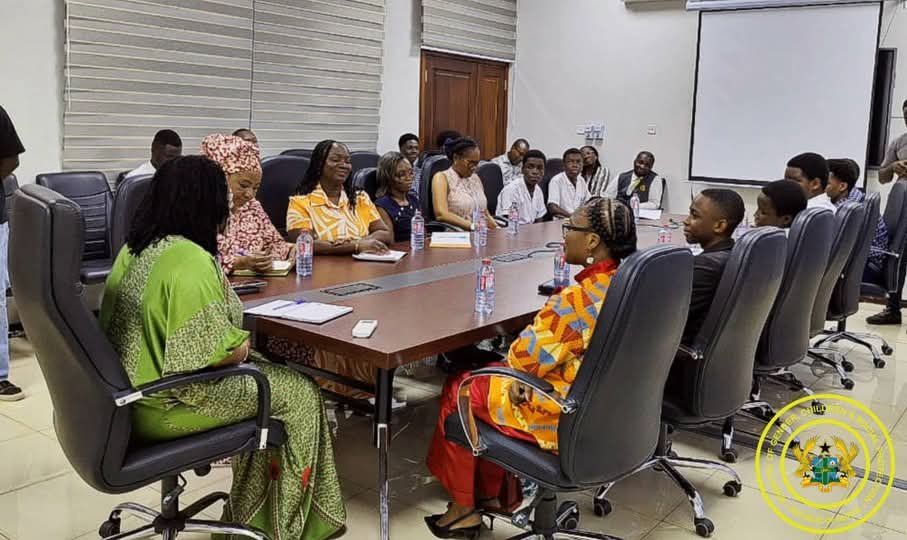News
Junior Shapers Africa pays courtesy call on Gender Minister

As part of activities to commemorate this year’s World Day of the Boy Child, Junior Shapers AFRICA – JSA Boys Mentorship, led by its Founding Director, Mrs. Ethel Adjorlolo-Marfo, paid a courtesy call on the Minister for Gender, Children and Social Protection, Dr. Agnes Naa Momo Lartey, ahead of the official celebration slated for Friday, May 16, 2025.
The meeting created a platform for selected boys and their teachers to engage the Minister on key issues affecting boys’ development in Ghana.
Discussions centered on raising awareness of boys’ challenges, bridging educational gaps, addressing school drop-out rates, strengthening support systems for boys, and promoting positive masculinity.
The selected boys from Christ the King School and Soul Clinic International School had an interactive discussion with the Minister, during which they emphasized the need for equal access to support systems for boys, the importance of giving boys the same attention and care as girls, and the need to encourage positive masculinity.
They also highlighted the importance of campaigns and workshops aimed at building the capacity of boys.
Additionally, they called on parents to play a pivotal role in the lives of their sons.
JSA is a male child development initiative that has, since its inception, been committed to grooming boys who are equipped to contribute meaningfully to society.
Through advocacy, mentorship programmes, and community engagements, the organization is helping reshape the narrative around boys’ development and their role in achieving gender equality.
Speaking during the engagement, JSA’s Ambassador, Jeremiah Komla Mawunyo, highlighted the importance of recognizing boys’ unique struggles and called for more inclusive approaches to child development.
In her remarks, Dr. Agnes Naa Momo Lartey expressed the Ministry’s commitment to supporting initiatives that promote the welfare of both boys and girls. She emphasized the Ministry’s ongoing mentorship and empowerment programmes and assured the group of continued partnership in advancing gender equality and youth development.
Present at the meeting were the Chief Director of the Ministry, Dr. Afisah Zakariah, and the Director of the Department of Gender, Madam Faustina Acheampong, who both reaffirmed the Ministry’s support for such meaningful engagements.
The visit also featured a presentation of an advocacy petition and a renewed call on parents to play more active roles in the upbringing of their sons.
News
Prioritise affordable treatment of sickle cell treatment —Health Expert

Health experts have urged Ghana to prioritise affordable and accessible treatment for sickle cell disease (SCD) as advanced, but costly curative therapies remain out of reach.
SCD, an inherited blood disorder, affects about three in every 100 newborns in Ghana.
Globally, around 1,000 babies are born with the condition daily, with three-quarters in sub-Saharan Africa.
The disease causes severe complications including chronic pain, anaemia, infections, strokes and organ damage, often leading to shortened life expectancy.
In recent years, gene therapy has been developed as a potential cure.
However, its cost—running into millions of dollars per patient—makes it financially and technically inaccessible in Ghana.
According to Dr Lawrence Osei-Tutu, a Sickle Cell and Childhood Cancer Expert at the Komfo Anokye Teaching Hospital, “the country must instead focus on practical, lower-cost interventions such as hydroxyurea”, a decades-old cancer drug proven to reduce painful episodes, hospitalisation and life- threatening complications in SCD patients”.
Taken orally, the medicine improves red blood cell function and is considered safe and effective.
“Hydroxyurea therapy is as good as the cure and a low-hanging fruit to pluck, we must bring a cure to our sickle cell warriors, but do so sustainably.” he urged.
In a chat with The Spectator here, he said to create awareness on the disease, the expert noted that despite its benefits, “hydroxyurea is not widely accessible in Ghana.”
Stressing that, “many patients either cannot afford it or struggle with irregular supply through the health system.”
Moreover, he argued that scaling up access would provide immediate relief while the country builds the infrastructure, trains specialists and secures funding needed to support curative therapies in the future.
With an estimated 15,000 babies born with sickle cell disease annually in Ghana, Dr Osei Tutu cautioned that “failure to improve access to effective treatment will leave many patients vulnerable to preventable complications and early death.”
From Kingsley E. Hope, Kumasi
Join our WhatsApp Channel now!
https://whatsapp.com/channel/0029VbBElzjInlqHhl1aTU27
Hot!
Let’s reintroduce Cultural Studies to complement educational reforms — Tourism Minister

Madam Abla Dzifa Gomashie, the Minister of Tourism, Culture and Creative Arts, has emphasised the importance of reintroducing Cultural Studies in schools as part of Ghana’s broader educational reform agenda.
She said Cultural Studies would complement existing efforts to reposition Science, Technology, Engineering and Mathematics (STEM) and Technical Vocational Education and Training (TVET) to promote digital literacy and expand Creative Arts education.
Speaking at the 2025 Homowo Festival of the people of Ningo-Prampram, held on the theme: “Education: The Best Legacy for our Children,” Madam Gomashie said cultural education was critical to national identity and development.
She noted that the festival’s theme aligned with the Government’s vision to transform education in Ghana and encouraged the youth to embrace it not only as a means of personal development but also as a way of preserving traditional values.
These values, including patience, wisdom, and hard work, were at the core of the Homowo celebration, the Minister said.
“Cultural festivals like Homowo are vital instruments for strengthening cultural identity, preserving historical memory, and fostering national unity. Additionally, festivals serve as platforms for educating the youth through storytelling, music, dance, and other traditional practices, while also providing opportunities for community engagement.”
Madam Gomashie highlighted the strong foundation that Ghana’s tourism was built on, which included culture, traditions, and the creative industry, collectively contributing to over GH¢4.8 billion to the economy.
“Festivals give tourists reasons to visit our country. Therefore, with the right infrastructure and the development of all the domains, the sector can do more than what has been recorded,” she added.
Mr Sam Nartey George, the Member of Parliament for Ningo-Prampram and Minister of Communication, Digital Technology and Innovation, commended the community for their vibrant participation in the festival. He announced plans for the construction of a new nursing training school in Ningo, aimed at expanding access to healthcare education in the area.
Nene Osroagbo Djangmah XII, Paramount Chief of Great Ningo Traditional Area; King Dr Tackie Teiko Tsuru II, Ga Mantse; Nene Tetteh Wakah III, Paramount Chief of the Prampram Traditional Area; Prof. Odaifio Welentsi III, Paramount Chief of the Nungua Traditional Area; Naana Dugbakuwor Dugba II, Paramount Queen Mother of Great Ningo; and Mr. Elvis Afriyie Ankrah, Special Envoy on Religion and Inter-Faith Affairs, who represented the Chief of Staff, were among dignitaries at the festival. -GNA














